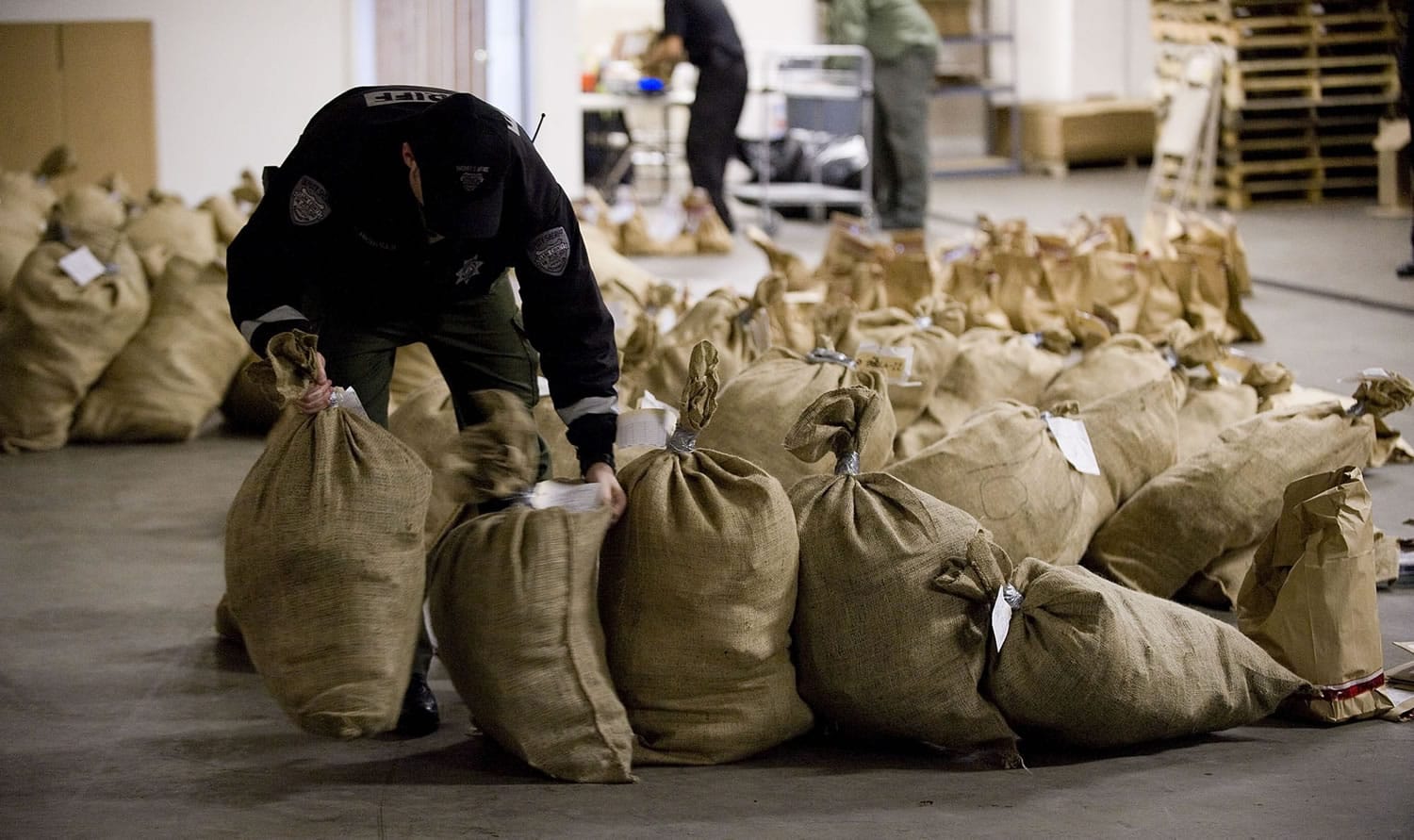Police officers are continuing to process evidence and investigate Thursday’s raids in Operation Gang Green.
The bust that netted 6,800 marijuana plants and saw 49 people arrested isn’t over just yet.
“We’ll analyze evidence to look for further connections between involved parties,” said Cmdr. Mike Cooke of the Clark-Skamania Drug Task Force. “We’re going to move forward to present a solid case for prosecution.”
Police don’t think the bust will necessarily take marijuana off the street in Clark County.
“Our indications are, this isn’t being grown locally to be smoked locally,” Cooke said. “It will affect drug availability in this group’s particular supply chain and where that supply chain ends up.”
Planning the sting
Officers were first made aware of what they call an organized crime ring in 2009. In late August, police started planning for the series of raids that would sweep through 56 Clark County locations on Thursday.
At first, information was locked down pretty tightly, Cooke said.
“As we identified needs, and when we’d have those needs, we brought people into the planning process,” he said.
The 300 officers who would eventually conduct raids on Thursday were brought into the loop three weeks ago. They didn’t know what they would specifically be doing until 6 a.m. Thursday after the morning briefing.
Planners had to identify houses that needed to be raided first. In some cases, several suspect homes were on the same street. To avoid tipping off residents of police activity, all the homes were hit at once, Cooke said.
In one case, that required four 20-person teams to congregate in one east Vancouver block at the same time.
About 25 people monitored the raid teams’ progress in real time and were informed when a home was entered, secured and left, Cooke said.
“We designed it so each team was self-sufficient in the field,” he said.
Planners expected to arrest 40 to 60 prisoners (they ended up with 49). They decided to create a mobile booking station at Vancouver Fire Department Station 4 in the Orchards area to avoid overwhelming the jail booking staff, Cooke said.
Suspects were booked in the field and transported to the jail by vans.
Commanders had to plan much more than just tactical details for the day.
That included arranging meals for officers, who would be working from 6 a.m. through the evening. Neighbors on Watch volunteers delivered sack lunches prepared by the jail food service to officers on location processing evidence or monitoring homes.
“The teams in the field, we wanted them to work uninterrupted,” Cooke said.
Overtime and staffing costs for the day will be largely picked up by the Organized Crime Drug Enforcement Task Forces, a federal group.
Drug task forces can petition the group to pay for drug investigations that require significant financial resources, Cooke said.
He asserts that the operation was a good use of time and money.
Many people say that marijuana is harmless, but they don’t talk about the stories of teenagers who stop caring about school, sports and friends, he said.
“I still want people to grow up to be productive members of society,” he said. “I don’t think marijuana and drugs are a productive choice.”
What about the pot?
Most — but not all — of the marijuana that was collected in Thursday’s raids will be incinerated.
“In something like this, we keep a small amount for evidence,” Cooke said. “The bulk of it is bagged and the evidence unit hauls it to an incinerator.”
There are a couple of incinerators in the region that the task force uses to destroy marijuana seizures. They’re industrial-size facilities, Cooke said, the sort of burners that might be used to incinerate trash.
“We get that question all the time in the field,” Cooke added. Whenever the task force raids a house with an indoor growing operation, “The neighbors ask what we’re going to do with the marijuana.”
Kids involved
Sherry Hill, spokeswoman for the state Children’s Administration, said no children were referred to Child Protective Services as a result of the raids.
Hill said the agency was involved in the planning for the raids and worked with law enforcement “from the get-go.” Typically, she said, police and caseworkers first evaluate whether other family members are available to care for children whose parents are arrested before taking those children into protective custody and placing them in temporary foster care.
When children are involved, police typically consider the option of not taking both parents into custody, said Cooke, the task force commander.
“Because of the sheer number of houses” involved in Thursday’s raids, Cooke said, “we tried to find caregivers who were present in the houses,” rather than remove the children.
“We can either arrest them or get a warrant for their arrest,” he said. “We know who these people are.”
No power stolen
Erica Erland, spokeswoman for Clark Public Utilities, said no power diversions were discovered in Thursday’s raids.
“Our team was called to inspect homes where law enforcement found rewiring,” she said. “But all of the electrical wiring was routed through the main meters and was paid for. The utility did not sustain any losses related to (Thursday’s) raids, and our equipment was unaffected.”
When diversions are identified at the site of a grow operation, Clark Public Utilities does work to recoup the cost of stolen power as part of any criminal case brought by prosecutors, Erland said.
Cars seized
Marijuana wasn’t the only item hauled off by officials in the raids, Cooke said. About 50 cars were seized — not just impounded, but seized.
That role went to agents of the Internal Revenue Service, one of 16 law enforcement agencies and departments that were part of the sweep.
Kathie Durbin and Tom Vogt contributed to this story.



